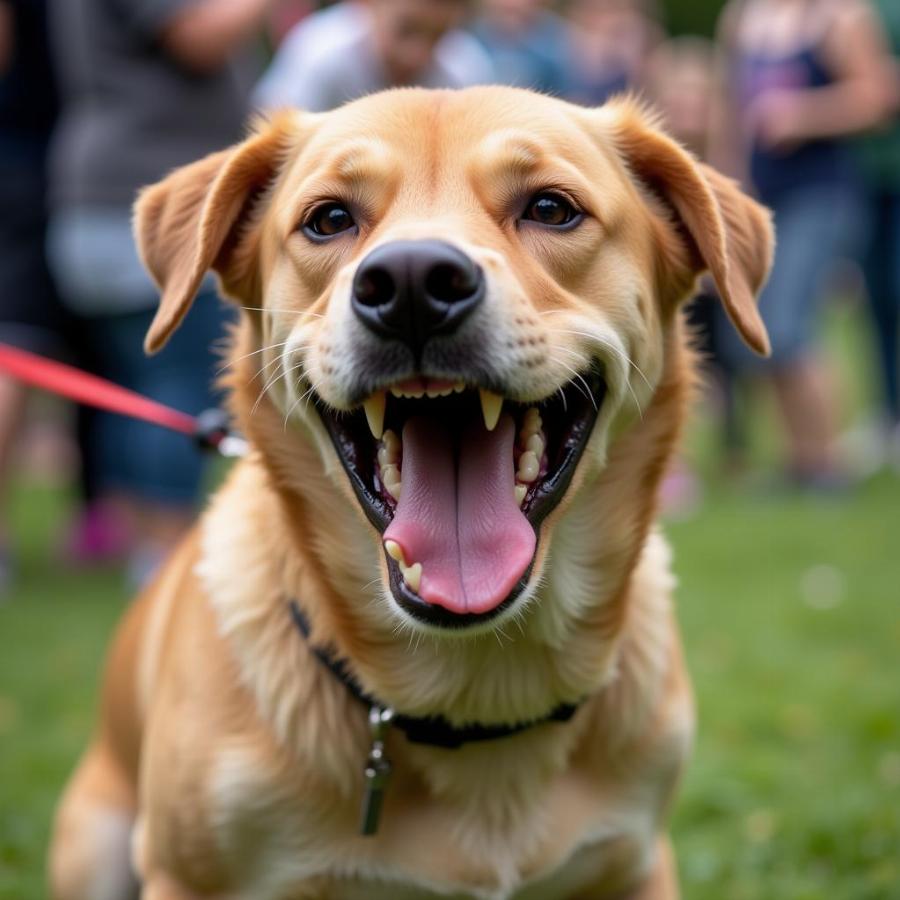The term “10 most ferocious dogs” often conjures up images of snarling beasts, but the reality is much more nuanced. While some breeds possess a greater capacity for aggression due to their size, strength, and protective instincts, labeling them as inherently “ferocious” overlooks the critical role of training, socialization, and individual temperament. This article will delve into the complexities of canine aggression, exploring ten breeds commonly perceived as ferocious while examining the factors contributing to their behavior and emphasizing responsible ownership.
Understanding Canine Aggression: It’s More Than Just Breed
 Aggressive Dog and its Causes
Aggressive Dog and its Causes
Before diving into specific breeds, it’s essential to understand that aggression isn’t an inherent trait tied solely to genetics. While certain breeds were historically bred for guarding or protection, their behavior is heavily influenced by environmental factors and individual experiences. A dog’s upbringing, training, socialization, and overall health play crucial roles in shaping their temperament. A poorly socialized Chihuahua can exhibit more aggressive tendencies than a well-trained Rottweiler.
Debunking the “Ferocious” Label: 10 Breeds Often Misunderstood
Rottweiler: Guardian, Not Monster
Rottweilers, with their powerful build, often top lists of “ferocious” dogs. However, with proper training and socialization, they can be loyal, loving companions. Their protective instincts can be channeled into positive behaviors, making them excellent family guardians.
Pit Bull: A Breed Defined by Misconception
The term “Pit Bull” encompasses several breeds, often unfairly stigmatized due to media portrayal and misuse in dog fighting. Like Rottweilers, they can be affectionate and gentle with proper care and training.
Doberman Pinscher: Elegance and Protection
Dobermans are known for their sleek appearance and intelligence. Their protective instincts make them natural guard dogs, but with positive reinforcement training, they can be well-adjusted members of any family.
German Shepherd: Versatility and Intelligence
German Shepherds are highly intelligent and versatile, often used in police and military work. Their loyalty and protective nature make them excellent guard dogs, but they also thrive in active families with consistent training.
American Staffordshire Terrier: Strength and Affection
American Staffordshire Terriers, often confused with Pit Bulls, are known for their strength and loyalty. They can be affectionate and playful companions with proper socialization and training.
Bullmastiff: Gentle Giant with a Protective Streak
Bullmastiffs are imposing in size but surprisingly gentle with their families. Their protective instincts make them excellent guard dogs, but they require early socialization to ensure they’re comfortable around strangers.
Caucasian Shepherd Dog: Imposing Protector
Caucasian Shepherd Dogs are massive and powerful, bred to guard livestock. Their size and protective instincts require experienced owners committed to consistent training and socialization.
Kangal Shepherd Dog: Livestock Guardian with Independence
Kangal Shepherd Dogs are another livestock guardian breed, known for their independence and protective instincts. Their size and independent nature make them unsuitable for inexperienced owners.
Akita: Loyalty and Aloofness
Akitas are known for their loyalty to their families and aloofness towards strangers. They require experienced owners who can provide consistent training and socialization to manage their protective instincts.
Cane Corso: Powerful Guardian with a Gentle Side
Cane Corsos are powerful and imposing, historically used as guard dogs. They can be affectionate with their families but require experienced owners who can provide firm and consistent training.
Is a “Ferocious” Dog Right for You? Considering Your Lifestyle
Choosing a dog breed requires careful consideration of your lifestyle, experience, and ability to provide proper training and socialization. While some breeds may have a predisposition towards certain behaviors, responsible ownership plays a crucial role in shaping a dog’s temperament.
Conclusion: Focus on Responsible Ownership, Not Labels
The concept of “10 most ferocious dogs” is a misleading simplification. While some breeds possess greater potential for aggression, responsible ownership, including proper training, socialization, and understanding a dog’s individual needs, is the key to preventing aggressive behavior and fostering a positive relationship with your canine companion. Remember, any dog, regardless of breed, can become aggressive if not properly cared for and trained.
FAQ: Addressing Common Concerns
- Are certain dog breeds inherently dangerous? No, a dog’s behavior is shaped more by environment and training than by breed alone.
- Can “ferocious” dogs be good family pets? Yes, with proper training and socialization, many breeds often labeled “ferocious” can be loving companions.
- What is the most important factor in preventing dog aggression? Responsible ownership, including training, socialization, and understanding a dog’s individual needs.
- How can I find a reputable breeder? Research breeders thoroughly, ask for references, and visit the breeding facility to assess the dogs’ living conditions.
- What are the signs of dog aggression? Signs can include growling, snarling, lunging, and biting.
- What should I do if my dog shows signs of aggression? Consult with a certified professional dog trainer or behaviorist.
- Are there legal restrictions on certain breeds? Yes, some areas have breed-specific legislation. Research your local laws before acquiring a dog.
Explore More at Beaut Dogs
You might also be interested in these related articles:
Beaut Dogs is your go-to resource for all things canine, offering expert advice and in-depth information on the fascinating world of dogs. From breed characteristics and care guides to training tips and product reviews, Beaut Dogs is committed to providing valuable resources for dog lovers everywhere. For personalized support and detailed answers to your dog-related questions, contact us at Email: [email protected]. We’re here to help you navigate the joys and challenges of dog ownership.